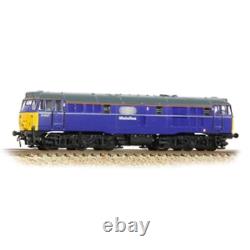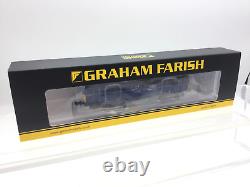Graham Farish 371-137TL N Gauge Class 31/4 Refurbished 31407 Mainline Freight



PLEASE REVIEW THE PHOTOGRAPHS AS WELL, ACCESSORIES/BOXES ETC WILL BE SHOWN IF THEY ARE INCLUDED. Depicting a Class 31/4 which was fitted with Electric Train Heating, this model also sports all the hallmarks of a refurbished machine with its bufferbeam cowling and bodyside band removed, headcode boxes plated over and radio pods present above each cab. The vibrant blue livery is expertly applied and is only accented by the orange cantrail stripe and the silver insignia and running number. Fitted with high intensity headlights at each end, which of course are functional, the model also features working tail and marker lights and is supplied with a pre-fitted speaker, making it easy to add sound to your model by fitting a sound decoder via the Next18 DCC decoder socket. Alternatively, why not opt for a SOUND FITTED model with pre-fitted sound decoder and bring your layout to life with sound straight out of the box.
31407 Accessory Pack NEM Coupling Pockets Coreless Motor Directional Lighting - independently switchable at each end via switches mounted on the circuit-board, or via DCC Speaker Fitted Equipped with a Next18 DCC decoder socket - recommended decoder No. The first Class 31 entered service in November 1957 and the design was one of the Pilot Scheme locomotives ordered by British Railways to replace steam traction. The Class was originally allocated to the Eastern Region, but gradually became common on both the Western and London Midland regions too.
The Class 31/1s were the standard locomotives, distinguished from the first batch of locos - the 31/0s - which had Red Circle multiple-working control equipment, a non-standard feature that led to them being withdrawn relatively early in the late-1970s. The 31/1s were fitted with Blue Star multiple-working equipment, as found on many other BR classes, and all had steam heating boilers from new, making them ideal for hauling passenger services. Commonly used in East Anglia, with allocations at Stratford and March depots, they were also found throughout the Eastern Region of BR with Finsbury Park sporting a large allocation, along with the depots at Tinsley, Immingham and Thornaby.Examples were also allocated to Bristol Bath Road and Old Oak Common on the Western Region, where they could be found working passenger trains as far west as Barnstaple and Paignton. In the early 1980s, Healey Mills and Bescot on the Midland Region also gained an allocation as replacements for Class 25s. During the 1970s some Class 31s were fitted with Electric Train Heating (ETH) and these were reclassified as 31/4s to denote this feature.
The 1980s would see BR undertake a programme of refurbishment for much of the fleet, this included the fitting of ETH to more locomotives but refurbishment was not reserved exclusively for the 31/4s, Class 31/1s were also refurbished without receiving ETH equipment. During refurbishment bufferbeam cowlings were removed along with the bodyside band, headcode boxes were plated over and fitted with two marker lights, and any remaining disc headcodes were removed.
Where steam heat boilers remained, these were removed and a concrete block added instead to maintain the weight balance. As passenger work dried up, many of the 31/4s were displaced and found themselves allocated to the departmental sector. In 1990, to reduce maintenance costs and prevent their ETH-fitted locos being borrowed for passenger work when extra traction was needed, the departmental sector isolated the ETH and removed the jumper cables from some of its 31/4s, resulting in these locos being reclassified as 31/5s. There were also two locomotives classified as 31/6, these had through ETH wiring fitted allowing them to work double-headed with an ETH-fitted loco.
Other operators however kept Class 31s active on the mainline and in 2022 it is still possible to see a 31 on the mainline. The Class has also been popular with the preservation movement, with more than 25 examples now preserved. Alternatively, why not opt for a. Model with pre-fitted sound decoder and bring your layout to life with sound straight out of the box. Directional Lighting - independently switchable at each end via switches mounted on the circuit-board, or via DCC. Equipped with a Next18 DCC decoder socket - recommended decoder No. Sales Area Exclusive Model - available from retailers in selected areas (see map for more details). Commonly uséd in East Anglia, with allocations at Stratford and March depots, they were also found throughout the Eastern Region of BR with Finsbury Park sporting a large allocation, along with the depots at Tinsley, Immingham and Thornaby. We make every effort to describe items accurately, however, nobody is perfect and on the odd occasion we may miss something. If you see anything which is incorrect in this listing, or wish to double check something, please feel free to ask a question. We include pictures of detailing packs, instructions and boxes etc if they are present and included in the price, if they are not in the photo's, you can safely assume they are not there. If in doubt, please ask and we will confirm. The photographs are also part of the listing, please review them carefully. You can do this by selecting the Request Total button during Checkout (this works only when using the E-Bay Website, it does not appear on the mobile app for phones and tablets). If you receive an item which is not in accordance with the listing, please get in touch BEFORE leaving feedback or opening a return. Resorting to bad feedback without giving us the opportunity to address the issue helps nobody.
